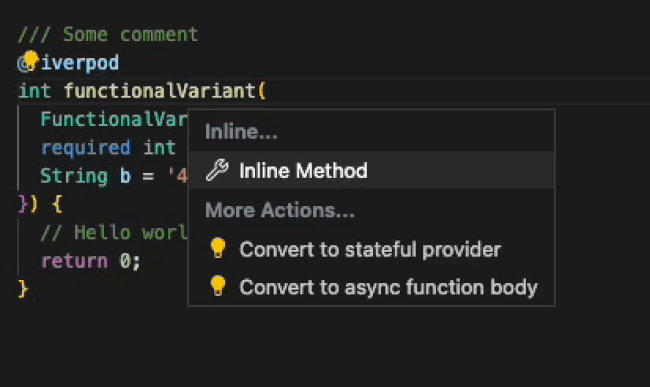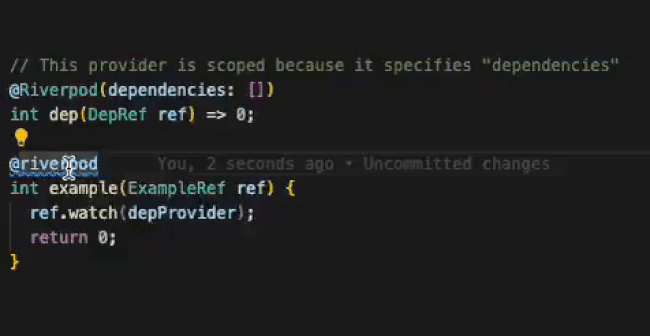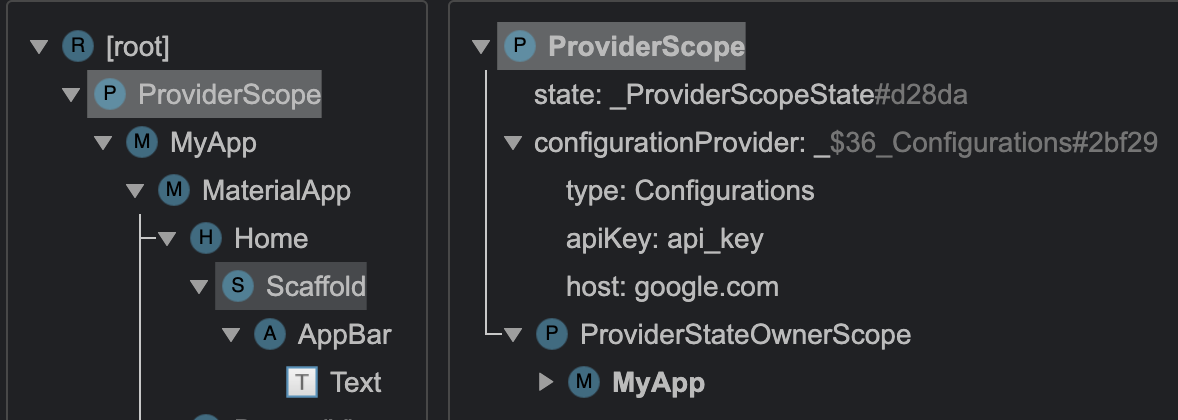Declarative programming
Write business logic in a manner similar to Stateless widgets.
Have your
network requests to automatically recompute when necessary and make
your logic easily reusable/composable/maintainable.
Easily implement common UI patterns
Using Riverpod, common yet complex UI patterns such as "pull to refresh"/ "search as we type"/etc... are only a few lines of code away.
Tooling ready
Riverpod enhances the compiler by having common mistakes be a compilation-error. It also provides custom lint rules and refactoring options. It even has a command line for generating docs.
Features
- ✅ Declarative programming
- ✅ Native network requests support
- ✅ Automatic loading/error handling
- ✅ Compile safety
- ✅ Type-safe query parameters
- ✅ Test ready
- ✅ Work in plain Dart (servers/CLI/...)
- ✅ Easily combinable states
- ✅ Built-in support for pull-to-refresh
- ✅ Custom lint rules
- ✅ Built-in refactorings
- ✅ Hot-reload support
- ✅ Logging
- ✅ Websocket support
- ✅ Documentation generator
Dichiarare uno stato condiviso da qualsiasi punto
Non c'è più bisogno di saltare tra il tuo main.dart e i file di UI. Scrivi il codice del tuo stato condiviso dove appartiene, che sia in un package separato o proprio accanto al Widget che ne ha bisogno, senza perdere la testabilità.
// A shared state that can be accessed by multiple widgets at the same time.
class Count extends _$Count {
int build() => 0;
void increment() => state++;
}
// Consumes the shared state and rebuild when it changes
class Title extends ConsumerWidget {
Widget build(BuildContext context, WidgetRef ref) {
final count = ref.watch(countProvider);
return Text('$count');
}
}
Ricalcola stati/UI rebuilds solo quando necessario
Non dobbiamo più ordinare/filtrare gli elenchi all'interno del metodo build o dover ricorrere ad un meccanismo di cache avanzato.
. Con Provider e "families", ordina gli elenchi o effettua richieste HTTP solo quando ne hai veramente bisogno.
List<Todo> filteredTodos(FilteredTodosRef ref) {
// Providers can consumer other providers using the "ref" object.
// With ref.watch, providers will automatically update if the watched values changes.
final List<Todo> todos = ref.watch(todosProvider);
final Filter filter = ref.watch(filterProvider);
switch (filter) {
case Filter.all:
return todos;
case Filter.completed:
return todos.where((todo) => todo.completed).toList();
case Filter.uncompleted:
return todos.where((todo) => !todo.completed).toList();
}
}
Simplify day-to-day work with refactors
Riverpod offers various refactors, such as "Wrap widget in a Consumer" and many more. See the list of refactorings.

Keep your code maintainable with lint rules
New lint-rules specific to Riverpod are implemented and more are continuously added. This ensures your code stays in the best conditions. See the list of lint rules.

Leggere in modo sicuro i provider
Leggere un provider non comporterà mai uno stato sbagliato. Se scrivi il codice necessario per leggere un provider, otterrai un valore valido.
Future<Configuration> configurations(ConfigurationsRef ref) async {
final uri = Uri.parse('configs.json');
final rawJson = await File.fromUri(uri).readAsString();
return Configuration.fromJson(json.decode(rawJson));
}
class Example extends ConsumerWidget {
Widget build(BuildContext context, WidgetRef ref) {
final configs = ref.watch(configurationsProvider);
// Use pattern matching to safely handle loading/error states
return switch (configs) {
AsyncData(:final value) => Text('data: ${value.host}'),
AsyncError(:final error) => Text('error: $error'),
_ => const CircularProgressIndicator(),
};
}
}
Ispeziona lo stato nel devtool
Usando Riverpod, il tuo stato è visibile fuori dallo schermo all'interno dello strumento di sviluppo di Flutter (devtool).
Inoltre, è in fase di sviluppo uno strumento completo di ispezione e modifica dello stato.
